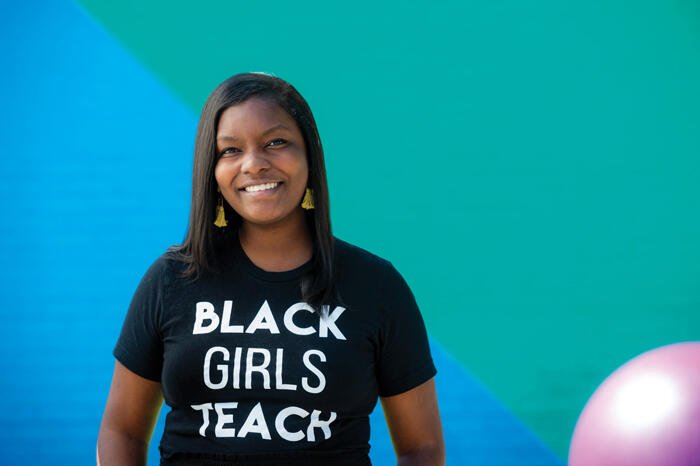Bria Wrigh, Profound Ladies member, teaches second grade at Hortons Creek Elementary School in Cary, North Carolina; Photography by Bryan Regan.
Every teacher has a moment that solidifies their calling into teaching. Mine happened in seventh grade, and it involved a stapler. To most, a stapler is just a tool to gather papers. Staplers are used to bind objects together but not forever. You can always remove a staple, but the holes are permanent. To me, a stapler represents my “why.”
I had a teacher, Ms. A., who I did not get along with. I was outgoing and liked to have a good time. She saw this as disrespectful and probably lacking manners. She saw my Blackness and my Black girl magic as a threat to her classroom management.
Come in class quietly, no loud talking, no joking, sit down, do your work. All of her expectations were rooted in compliance. I will assume that she did not recognize this form of discipline was extremely oppressive and rooted in racism. And at the time, I didn’t recognize this as racism. Not quite. But I knew it wasn’t fair, and it definitely was not just.
Ms. A. tried to silence me with office referrals, steps into the hall to “talk,” with phone calls home and lots of microaggressions to tell little seventh-grade me that my Blackness was not welcome in her classroom. She tried so hard to bind me to her expectations.
Then one day, it happened. After a back and forth, she took a stapler and threw it at me. A grown woman threw a stapler at a seventh grader, causing classroom trauma that still, to this day, I cannot make sense of.
It took me years to crawl out of the dark space that she put me into and recognize that outgoing Black girls do have a place in the math classroom. And that is precisely why I teach.
In Culturally Responsive Teaching and the Brain, scholar Zaretta Hammond wrote that “authentic engagement begins with remembering that we are wired to connect with one another.” My students are wired to connect to one another, and I entered this profession because I want to create the connections that Ms. A. did not.
At my school, we believe that together is better. We believe that relationships matter and relationships take work. Attending extracurricular events, having lunch bunches, creating opportunities for students to lead morning meeting and closing circle, sharing student work on my walls—I am intentional about co-creating a classroom space that is safe, positive and affirming for all students.
I believe in the power of developing and nurturing meaningful connections with my students. This is why I begin the school year with a “multicultural self” map activity. I want students to be able to identify parts of their identities that are valuable to them and feel proud of them. We hang up these maps in the classroom to show off the beauty in all of our identities coming together to learn.
This school year, I had the honor of being named teacher of the year for my school. I was asked to create a portfolio for our district. I wanted my students to be the center of this work, so I gave them a camera and told them to talk about how I make them feel. One of my kiddos mentioned in her video clip that what she enjoys most about our class is that we can have real conversations about real things such as racism and social justice.
When I heard this, I immediately started crying. I felt my “why” come full circle, from facing racism as a student to now being able to have open and honest conversations with my students about racism. Who would’ve thought that the little Black girl who had the stapler thrown at her in seventh grade would turn around and be leading a classroom, freeing myself and my students by creating a classroom space where our authentic selves are welcome?
This is why I teach. I teach for the little Black girls who are told their voices don’t matter. I teach for the little Black girls who have their voices misread as attitude and not confidence and passion. I teach for the little Black girl who had a stapler thrown at her and continues to have microaggressions thrown her way. I teach for the little Black girls who feel as though they aren’t good enough.
Because, I want to tell them, because, sweet girls, you are. You are more than enough. The world needs you to sprinkle your Black girl magic any- and everywhere you go. Don’t let anyone bind you to their low expectations or stereotypes. Don’t let anything stop you from sharing your magic with the world.
Story originally published by Learning for Justice, Issue 65, Fall 2020: I Teach for Black Girls Like Me | Learning for Justice.

